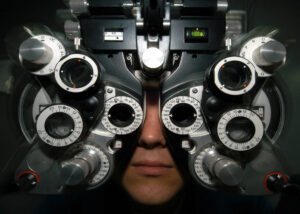Practice Management
November 2007
by Matt Young
EyeWorld Contributing Editor
Practitioners share ideas to prevent patient complaints
David H. Aizuss, M.D., was the best ophthalmologist his 81-year-old glaucoma patient had ever seen, but she angrily told him she was never coming back for his services again. That’s because, Dr. Aizuss recalled, he charged her a refraction fee. “She left the office quite happy, or so I thought,” said Dr. Aizuss, Encino, Calif. “Two weeks later I received a two-page typewritten hate letter informing me that even though I was the best ophthalmologist she has ever seen, she would not come back because I ‘fraudulently’ charged a refraction which no other ophthalmologist has done in ’20 years.’”
The woman also had called the Centers for Medicare and Medicaid Services, according to Dr. Aizuss, and claimed the agency “informed her that I should not have charged a refraction.”
She also threatened to file a medical board complaint. “Needless to say, I called her back and suggested she seek her care elsewhere,” Dr. Aizuss said. “She had the audacity to say that she wanted to continue under my care but she expected not to be charged any fees beyond Medicare for any services she might require and if I charged her a refraction or asked her to pay deductibles she would file complaints with any regulatory agency she could, and [said] that she was still practicing law at 81.”
Dr. Aizuss promptly discharged her from his practice. And while his story is a stunner, some ophthalmologists say they commonly have difficulties charging patients for refraction, since it is indeed not a service covered by Medicare.
Jon-Marc Weston, M.D., Roseburg, Ore., however, appears to have found a way to limit patient moaning and groaning.
EyeWorld Factoid
Ninety percent of ocular injuries could be prevented with protective eyewear
Prevent Blindness America, Feb. 2004
His office developed a form letter that dispelled any patient gripes over refraction charges. This is how it reads:
One of the most important parts of your eye exam today is the refraction. That is the part of the exam by which we determine whether you can be helped in any way by a new glasses prescription. It is also how we determine the best possible visual acuity and function of your eye, which is essential medical information for us to have as we assess your eyes and look for problems. It is NOT a covered service by Medicare and many other insurance plans. These plans consider refraction a “vision” service not a “medical” service. Our office fee for refraction is $—— and unless your plan automatically covers the refraction charge, this fee is collected at the time of service in addition to any co-payment your plan may require. Should your plan pay us for the refraction, we will reimburse you accordingly.
Then the patient either signs and dates below this acknowledgement:
I have read the above information and understand that the refraction is a non-covered service. I accept full financial responsibility for the cost of this service and understand it is due at time of service. I understand that any co-payment, coinsurance or deductible I may have are separate from and not included in the refraction fee.
Or, the patient signs and dates below this paragraph:
I decline the refraction service today. I understand that without the refraction, Dr. Weston or Dr. Tronnes may not be able to fully assess the health and function of my eyes.
“This is a standard for all new patients,” Dr. Weston said. “We want the patient to know our policy in advance. That way we get the info we need, and the patient knows he must pay for the non-covered service and the patient declines and we go forward without [it].”
Dr. Weston said he also sometimes further explains that the patient’s own insurance makes refraction a non-covered service, and that “we don’t make the rules but we all have to live with them.”
Less than 5% of his patients actually decline the refraction. The office also doesn’t field many calls from patients asking what a refraction is when they get their invoices.
He also added that ophthalmologists “are long past the point where we can do this [refraction] for free.”
Still, refraction complaints may surface most often in clinics that traditionally have not charged for refraction, and then begin to do so for the first time. William Trattler, M.D., director, Cornea, Center for Excellence in Eye Care, Miami, said his clinic does not use a form letter to explain refraction charges, but he said 99% of patients don’t even mention the refraction charge. He believes that’s because his clinic has always charged for refraction. “Occasionally patients object,” Dr. Trattler said. “Just inform patients Medicare doesn’t cover refraction, as they just do not cover non-medical conditions.”
Dr. Trattler said that when he has already examined a patient who refuses to pay, it is the practice of his office to not issue a prescription for the patient. The only difficulty with this method, Dr. Trattler said, is if patients’ refraction only changes slightly, they may not want to pay the extra money for a new prescription.
Editors’ note
The physicians interviewed have no financial interests related to their comments.
Contact Information
Aizuss: 818-990-3623, DAizuss@pacbell.net
Trattler: 305-598-2020, wtrattler@earthlink.net
Weston: 541-672-2020, DrW@westoneyecenter.com



